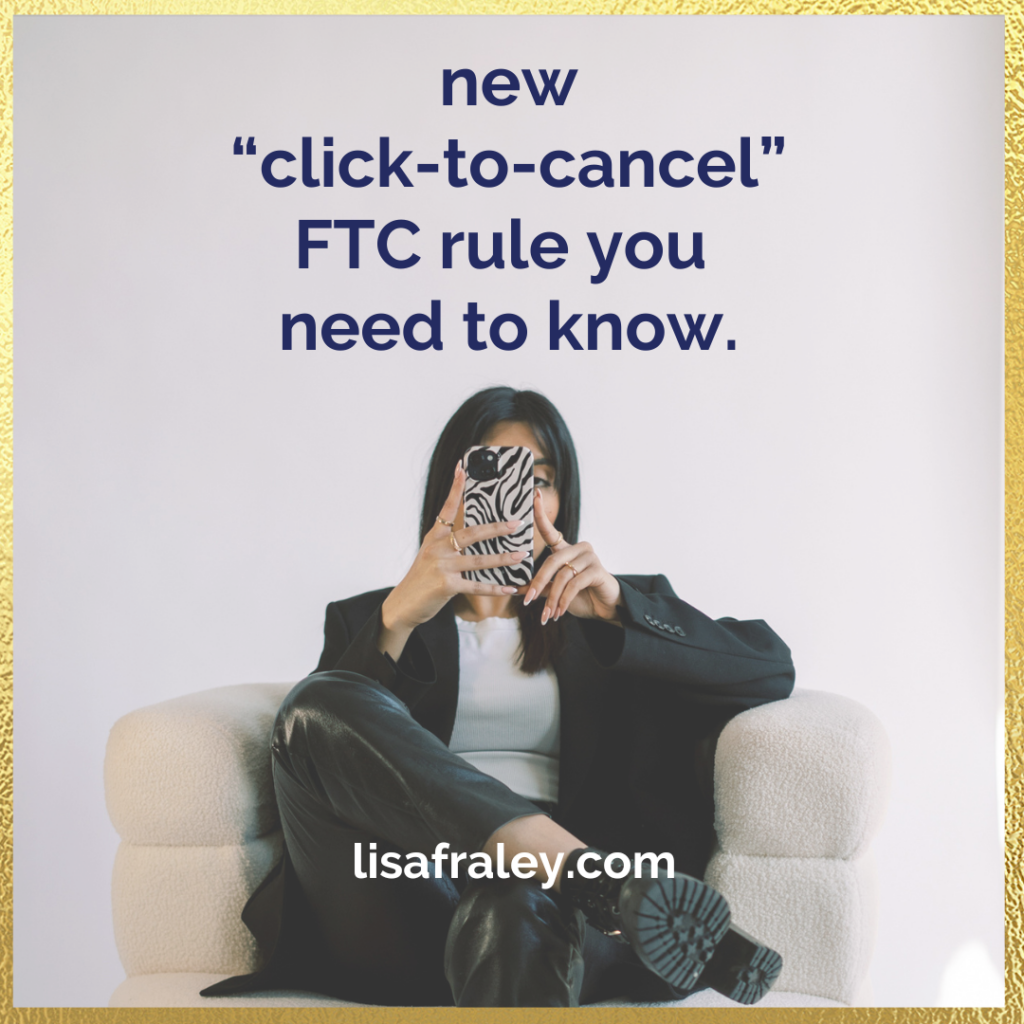📣 New “click-to-cancel” FTC rule you need to know
Have a membership?
Sell supplements on autoship?
Offer some other kind of subscription to your clients or customers?
📣Listen up – there’s a new “click-to-cancel” rule being issued by the Federal Trade Commission (FTC) that requires anyone who offers a subscription to make it really easy for people to cancel.
The law is meant to address the frustration we all feel when we sign up for a streaming service, gym membership, or a recurring order online, and we can’t find the “cancel” button easily on their website.
Or when a company makes you wait forever on hold and then talk with a customer service agent to cancel your subscription. (I love you doTERRA, but I’m looking at you!)👀
The new FTC rule also applies to other subscriptions too. So if you offer any kind of recurring membership or subscription, it applies to YOU.
(Know that this new rule does NOT apply to installment payment plans used for payment of services, like a 4-pay plan for a coaching program. That’s not what I’m talking about.)
The FTC rule applies to recurring orders like Netflix or Snap Fitness or doTERRA, and digital programs where your credit card is automatically charged – like for a “Healthy Gut Monthly Membership”.
So, as a biz owner, here’s what you need to know about the new FTC rule. It says:
1. It must be as easy to cancel as it is to sign up.
You can’t make it more difficult for people to cancel your membership or subscription or recurring-payment-offer than when they join.
2. It must be obvious and easy to find the “cancel” button on your website and in your communication.
It must be obvious on your website or portal where people can cancel – like “click-here-to-cancel your membership” or “cancel here”.
3. You can’t require customers to talk with a live person on the phone to cancel.
They must be able to cancel on their own time. This means if they signed up for your membership through a discovery call, they must be able to cancel through your website or online portal.
You can’t make people cancel by talking with you or a team member on the phone or in person, even if they signed up by phone or in person.
4. You can’t continue to bill people after a free trial.
You can’t do continuous billing after a free trial unless the client overtly agrees to it. (This should go without saying.)
5. You can’t misrepresent any facts about the offer.
Obviously, be honest about all of the details about what they’re purchasing. This means that your contracts and legal terms should spell out EXACTLY how many calls they receive, how long they are, what other benefits they receive, how much the program costs, how to cancel/terminate the relationship, and more.
And, most importantly, BE SURE YOU DO THIS….
6. You can’t charge someone’s credit card until AFTER you’ve clearly spelled out the features, costs, billing dates, and key info in your legal terms.
This means that the client needs to agree to your legal terms BEFORE you charge their credit card for the membership or subscription. Not the other way around.
▶️(By the way, if you need legal terms for your group programs, products, and memberships sold through your website, check out my DIY Terms of Use here.)
This new law goes into effect in 5 months, but you want to start making these changes now.
Here’s the bottom line, friends…
You must tell people exactly what they are agreeing to before you charge their credit card – and make it really easy and obvious for them to cancel anytime through your website without having to talk with a live person.
I hope that learning about this new FTC rule is helpful to you. The aim of the FTC is to protect consumers, so sometimes as business owners we have to jump through a few hoops like this to stay compliant with the law.
Know that I always want to keep you aware of new laws and rules that affect you and your business so I wanted to share this info with you.
If you have questions, feel free to reach out to us anytime at clientlove@lisafraley.com. That’s what we’re here for! 😀
Here’s to getting legally covered!
There is a lawsuit underway by cable and internet providers and home security companies to this “click-to-cancel” rule. Lawsuits generally take a while to be decided so we need to follow this new rule until we hear otherwise. I’ll keep you posted!




